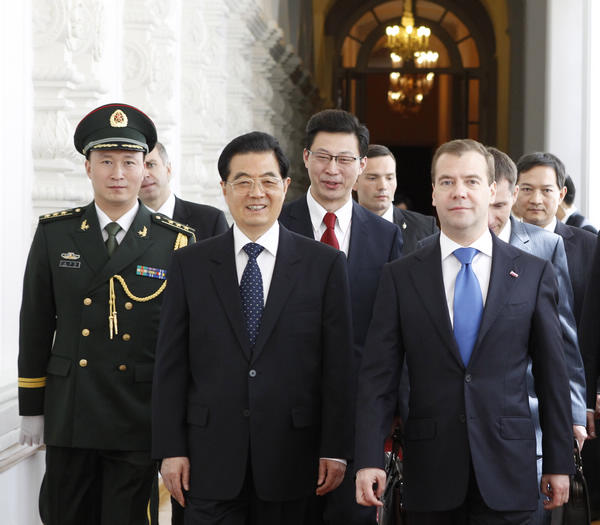Foreign and Military Affairs
New era for Sino-Russian ties
Updated: 2011-06-17 07:13
By Wu Jiao and Qin Jize (China Daily)
|
 Chinese President Hu Jintao meets Russian President Dmitry Medvedev at Kremlin in Moscow, capital of Russia, June 16, 2011. [Photo/Agencies] |
Joint declaration pledges mutual support on key security issues
MOSCOW - China and Russia deepened their strategic relationship on Thursday by vowing to support each other on core security issues.
In a joint declaration, signed by President Hu Jintao and his Russian counterpart Dmitry Medvedev, the two countries pledged support for each other on a wide range of issues, including Russia's security challenges from the United States and Europe.
The declaration also stresses the common principles of "non-interference" and "less military action" in solving situations in global hotspots, including the Korean Peninsula and the Middle East and North Africa.
|
||||
Speculation has been increasing in some quarters that the US wants to counterbalance the rising regional clout of China. US interference in bilateral disputes between China and some Southeast Asian countries has fueled the speculation.
China and Russia said in the declaration that their "strategic partnership has been a key factor in the peace and stability of the Asia-Pacific region".
The declaration backs Russia against US-led missile defense plans in East Europe and stresses that priority be given to political and diplomatic solutions.
It also highlighted the importance of ensuring the peaceful exploration of outer space.
On the Korean Peninsula nuclear issue, the two countries reaffirmed the importance of a political and diplomatic solution under the framework of the Six-Party Talks and called for a resumption of the talks as soon as possible.
Targeting the frequent military exercises staged by the Republic of Korea and the US, China and Russia voiced their firm belief that "lowering military intensity in the region will be conducive to the resumption of the Six-Party Talks".
Both China and Russia are committed to building a multilateral mechanism to guarantee peace and security in Northeast Asia.
The two leaders also talked about Iran's right to a civilian nuclear program, saying that they will strive to restore the confidence of the international community in the peaceful nature of Iran's nuclear program.
Russia and China oppose outside interference in the unrest in the Arab world, the declaration said.
"Outside forces should not interfere in internal processes in the countries of the region."
The two presidents also expressed concern over the situation in Libya, calling for an end to hostilities.
Russia said earlier that it opposes the UN Security Council adopting any resolution on Syria, risking a major dispute with the West.
As two veto-wielding members of the United Nations Security Council, it is rare for China and Russia to issue joint declarations on major world issues.
Ji Zhiye, a scholar with the China Institutes of Contemporary International Relations, said the declaration was issued at a "critical time" because of the Middle East situation.
The declaration will serve as a basic guideline for Sino-Russian cooperation, Ji said.
Feng Yujun, a colleague of Ji, said China and Russia share common concerns over how to maintain regional stability and peaceful development.
"It's important for China and Russia, two major nations in Eurasia, to enhance cooperation in promoting peace and stability in the region, especially now when the crisis in the Middle East and North Africa may spread."
Hu is currently on a state visit to Russia to celebrate the 10th anniversary of the signing of the China-Russia Treaty of Good-Neighborliness, Friendship and Cooperation.
The two countries have staged a series of events to mark the event.
In another declaration issued on Thursday by the two leaders, both countries vowed to step up military cooperation.
Wang Haiyun, vice-president of the Chinese Society for the Study of the History of Sino-Russian Relations, said the establishment and development of a strategic cooperative partnership between China and Russia is based on, and supported by, their common strategic interests.
Over the next few decades, the two countries will be embarking on a period of rapid development. There is a pressing need, for both countries, for a stable regional and international environment, Wang said.
Qin Jize in Beijing contributed to this story.
E-paper

Pearl on the Yangtze
Wuxi is considered a town of natural beauty and its motto is "city of water and warmth".
Prose and consternation
Riding on a mystery train
Way of a warrior
Specials

When two are one
After a separation of 360 years, Huang Gongwang's famous Dwelling in the Fuchun Mountains has been made whole again.

Wealth of difference
Rich coastal areas offer contrasting ways of dealing with country's development

Seal of approval
The dying tradition of seal engraving has now become a UNIVERSITY major



